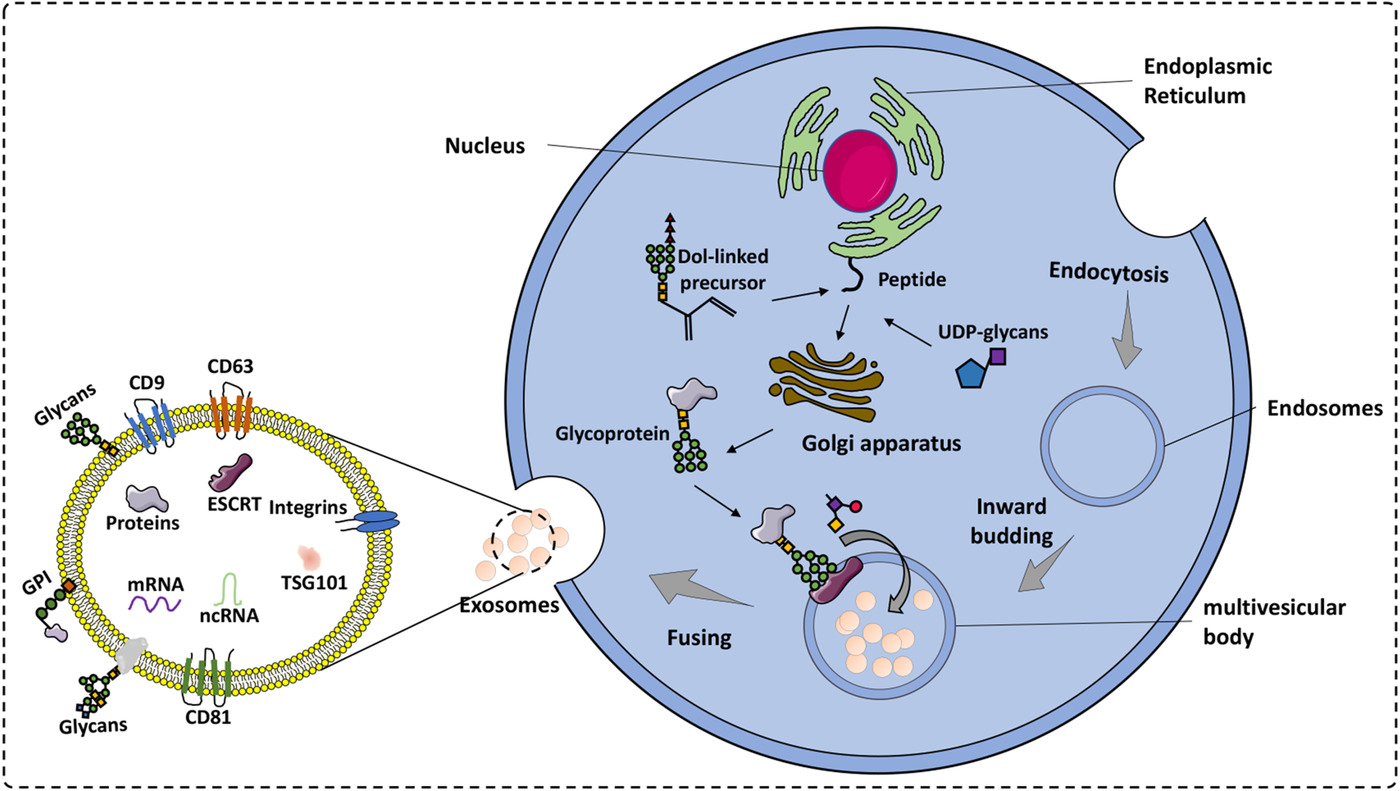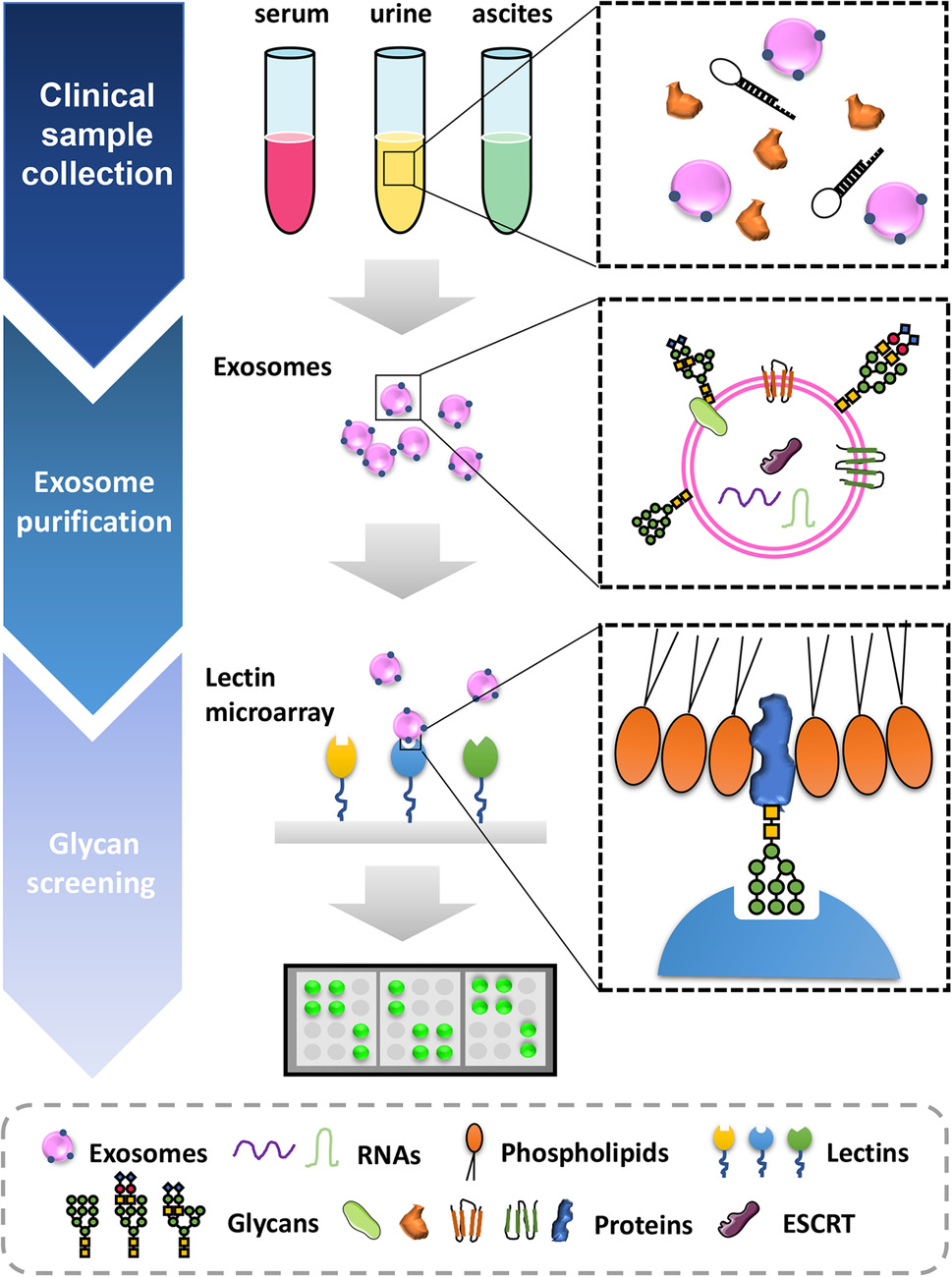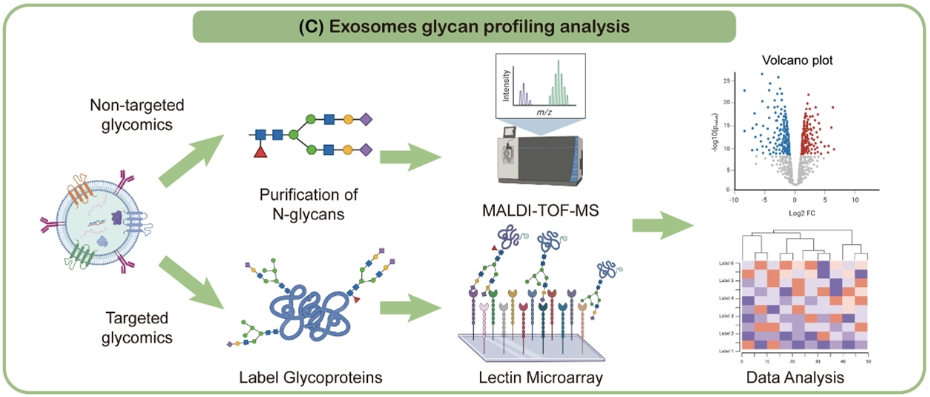Glycosylated Exosome Detection Service
Exosomes are nanoscale membranous vesicles secreted by cells that play a pivotal role in intercellular communication, immune regulation, and disease progression. In recent years, glycosylated exosomes have gained significant attention due to their unique glycosylation patterns, which are essential in various biological processes. Glycosylation modifications influence exosome stability, target cell recognition, and signal transduction and are closely associated with cancer, neurodegenerative diseases, autoimmune disorders, and infectious diseases. Therefore, characterizing the glycosylation profile of glycosylated exosomes is crucial for understanding their biological functions and exploring their potential in disease diagnosis and personalized medicine.
Glycosylated exosome formation involves glycosylation modifications within the endoplasmic reticulum (ER) and Golgi apparatus, as depicted in the illustration below. Exosomes are generated within multivesicular bodies (MVBs) via inward budding and are subsequently released into the extracellular environment, where they enter bodily fluids. The glycosylation modifications of both surface and internal proteins dictate their role in cell-to-cell communication and influence their function in disease microenvironments.

Lin, S. et al. Clin Transl Med. 2020.
Figure 1. Glycosylated Exosome Formation and Trafficking Pathway
To address the growing demand for precise analysis of glycosylated exosomes, MtoZ Biolabs provides Glycosylated Exosome Detection Service with advanced glycomics analysis technology and high resolution mass spectrometry platform to comprehensively analyze the glycosylation modification characteristics of exosomes. Our Glycosylated Exosome Detection Service can help researchers to deeply explore the role of glycosylated exosomes in physiological and pathological processes, and provide powerful technical support for early diagnosis of diseases, biomarker screening and personalized medicine.
Services at MtoZ Biolabs
MtoZ Biolabs’ Glycosylated Exosome Detection Service employs advanced exosome enrichment techniques and glycosylation analysis strategies, offering the following core detection solutions:
· Exosome Isolation and Purification: High-purity exosomes are obtained through ultracentrifugation, density gradient centrifugation, and size exclusion chromatography (SEC).
· Glycoprotein Enrichment: Efficient enrichment of glycosylated proteins using lectin affinity chromatography (LAC) and hydrophilic interaction liquid chromatography (HILIC).
· Glycosylation Site and Glycan Structure Analysis: Precise identification of glycosylation sites, glycan structural characterization, and relative quantification using liquid chromatography-tandem mass spectrometry (LC-MS/MS).
· Glycan Profiling: Characterization of N-glycans, O-glycans, and sulfated glycans on exosome surfaces through lectin blotting, enzymatic digestion, and fluorescence-labeled glycan analysis.
· Data Processing and Bioinformatics Analysis: Comprehensive glycosylation site mapping, glycan isomer differentiation, and quantitative analysis to provide deep insights into the functional roles of glycosylated exosomes.

Lin, S. et al. Clin Transl Med. 2020.
Figure 2. Workflow of Glycosylated Exosome Detection
Advantages
1. Technical Advantages
· Ultra-Sensitive Mass Spectrometry Detection: High-resolution analysis using Thermo Fisher Orbitrap Fusion Lumos and Q Exactive HF-X, ensuring precise identification of glycosylation modifications in exosomes.
· Multi-Dimensional Glycosylation Analysis: Integrating LC-MS/MS, lectin-based enrichment, and glycan structural profiling to comprehensively assess glycosylation patterns.
· Comprehensive Glycoprotein Characterization: Systematic analysis of glycosylated proteins and modification sites to elucidate the impact of glycosylation on protein functionality.
2. Service Advantages
· Tailored Analytical Solutions: Customizable Glycosylated Exosome Detection Service to accommodate diverse experimental requirements.
· Expert Data Interpretation: Detailed analytical reports with in-depth bioinformatics-driven insights to facilitate robust data interpretation.
· One-Time-Charge: Our pricing is transparent, no hidden fees or additional costs.
Applications
Glycosylated Exosome Detection Service is widely applicable across multiple biomedical research fields, including:
1. Cancer Research: Investigating the role of glycosylated exosomes in tumor progression and identifying potential biomarkers for early cancer detection.
2. Neurodegenerative Diseases: Exploring glycosylation changes in exosomes associated with Alzheimer’s disease, Parkinson’s disease, and other neurological disorders.
3. Autoimmune Diseases: Unraveling the impact of glycosylation in rheumatoid arthritis, systemic lupus erythematosus, and related conditions.
4. Infectious Diseases: Examining the function of glycosylated exosomes in viral infections and host-pathogen interactions.
5. Precision Medicine & Drug Discovery: Utilizing exosomal glycosylation markers to develop personalized diagnostic assays and targeted therapies.
Case Study
Case 1: Glycosylated Exosome Profiling for Triple-Negative Breast Cancer Biomarkers
In this study, MALDI-TOF-MS and lectin microarray were employed to analyze exosomes derived from triple-negative breast cancer (TNBC) patients. The findings revealed that galactosylation and sialylation patterns of glycan chains serve as potential diagnostic biomarkers for TNBC. Additionally, CD63 glycoprotein was used for in situ detection of exosomal glycosylation, demonstrating the promising role of glycosylated exosomes in liquid biopsy for cancer diagnostics. This research provides strong validation for the application of Glycosylated Exosome Detection Service in biomarker discovery and precision oncology.

Zhao, X. et al. ACS Nano. 2025.
FAQ
Q1: Can this service detect different types of glycosylation?
Yes, Glycosylated Exosome Detection Service can detect a wide range of glycosylation modifications, including N-glycosylation, O-glycosylation, sialylation, and sulfation. We employ lectin affinity chromatography (LAC), LC-MS/MS, and glycan derivatization techniques to precisely identify glycosylation sites and glycan structures, enabling both qualitative and quantitative analysis to support functional glycomics research and biomarker discovery.
Q2: What types of biological samples are compatible?
Glycosylated Exosome Detection Service supports a broad range of biological samples, including serum, plasma, urine, cerebrospinal fluid, ascites, cell culture supernatants, tissue homogenates, and other bodily fluids. We provide detailed sample submission guidelines to ensure optimal experimental outcomes. Contact us for customized recommendations based on your research needs.
MtoZ Biolabs integrates high-resolution mass spectrometry platforms with advanced glycomics analysis strategies to offer comprehensive Glycosylated Exosome Detection Service that enables researchers to elucidate the functional roles of glycosylated exosomes in disease pathogenesis and precision medicine. Whether you are conducting research on cancer, neurodegenerative disorders, or autoimmune diseases, our state-of-the-art glycosylation analysis provides valuable insights for scientific discovery and clinical translation.
How to order?







